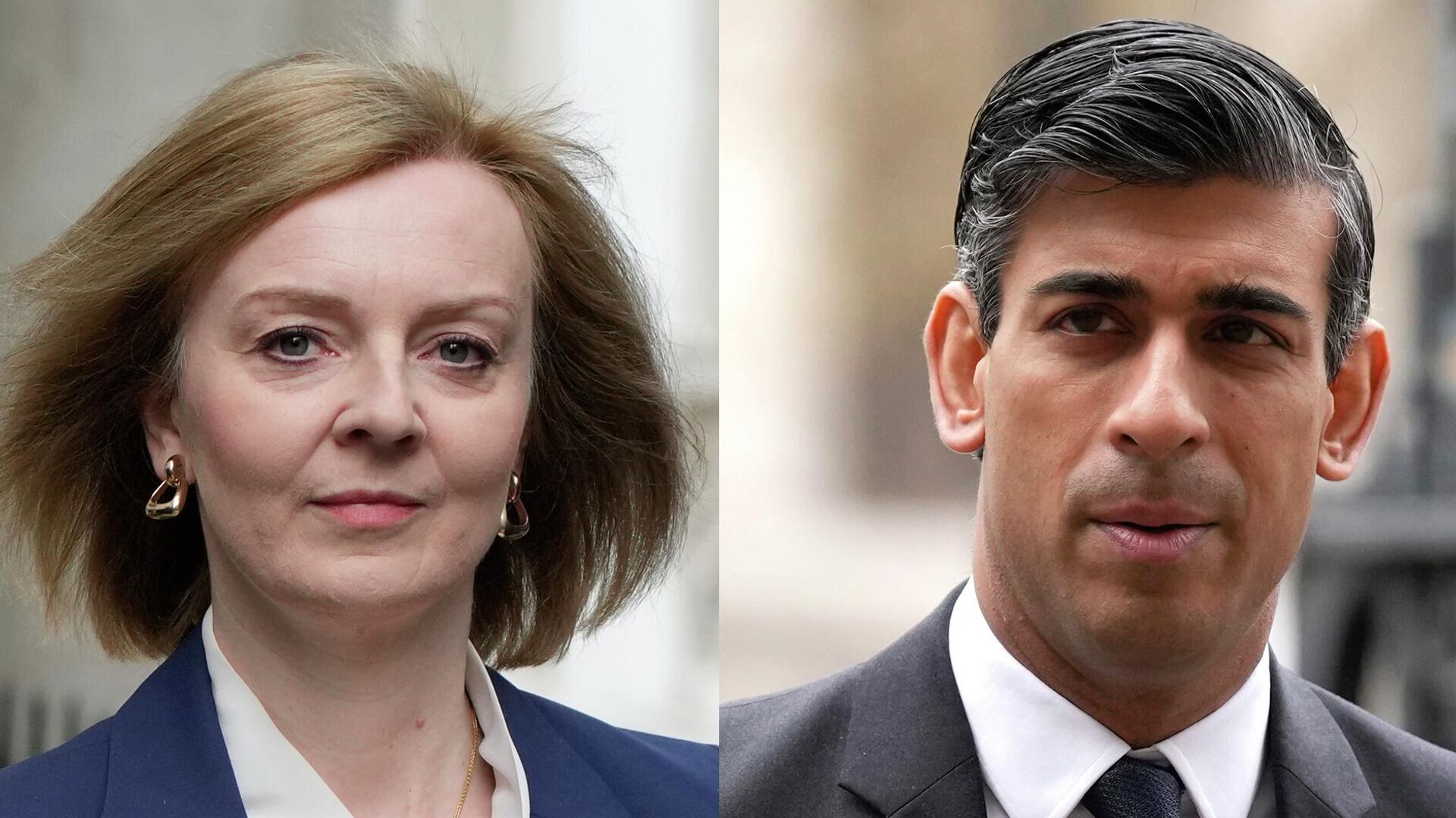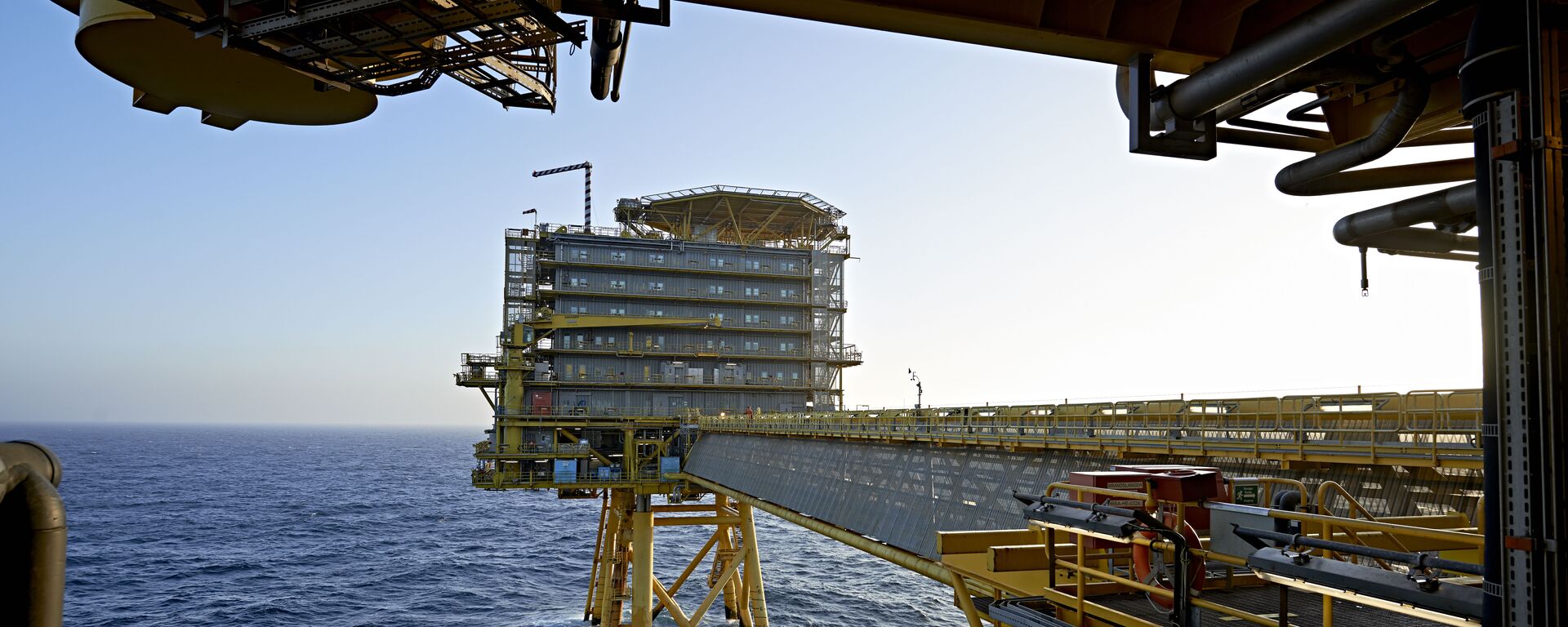Britain Will 'Survive But Suffer' Under Liz Truss Leadership, Pundits Say
23:57 GMT 30.08.2022 (Updated: 15:20 GMT 28.05.2023)

© AP Photo / Alastair Grant/Matt Dunham / The two candidates in the Conservative Party leadership race, former Chancellor of the Exchequer Rishi Sunak and Foreign Secretary Liz Truss
Subscribe
The Conservative Party leadership contest has seen "blue-on-blue" below-the-belt attacks by the campaigns of Liz Truss and Rishi Sunak on each others' policies and personal integrity. But both have struggled to present a credible plan for dealing with the cost-of-living crisis.
Academics believe the UK will get through the "self-inflicted" inflation crisis under the next prime minister — but it won't be painless.
Foreign Secretary Liz Truss remains the favorite to succeed Boris Johnson as Conservative Party leader and PM when the result of the members' ballot is announced on September 5.
But her rival, former chancellor of the exchequer Rishi Sunak, has attacked Truss over her plans to reverse his increase in corporation tax from 19 per cent to 25 per cent — set to come into force next April — along with other mooted tax cuts adding up to some £30 billion as her solution to the energy crisis that could tip millions of households into fuel poverty this winter.
Sunak raised corporation tax, along with national insurance, the British social security tax, to help repay some £400 billion in debts run up during the COVID-19 pandemic and to help the National Health Service (NHS) clear the resulting backlog of non-urgent cases. He has said that if he is elected leader, he will only lower those taxes again "once we’ve gripped inflation."
But this year he also announced billions worth of assistance to households to help pay energy bills — to be paid for out of their own future taxes and by a 'windfall tax' on oil and gas producers who continue to make unprecedented profits as global market prices soar.
Truss has been tight-lipped on the details of how she will tackle the cost-of-living crisis — brought on by the West's sanctions on Russia over its special military operation in Ukraine.
That has left the British media to speculate, including on claims that she plans to cut five per cent from the value-added tax (VAT), currently charged at of 20 per cent on most goods and five per cent on household — but not business — energy bills.
Kevin Dowd, professor of finance and economics at Durham University, gave a scathing assessment of Truss, telling Sputnik she had "no viable strategy on anything."
The academic was more sympathetic to her strategy on the cost-of-living crisis.
"There is no such thing as an unfunded tax cut," Dowd stressed, echoing those fiscal conservatives who do not class them as a giveaway to citizens. "But a package of tax cuts and cost of living support is feasible."
But he warned there was little the government could do to ease the pain already being felt by ordinary people.
"There will be a lot of support, including tax cuts and possible price caps, but it won’t be enough to avoid a huge outcry," Dowd said. "A lot of people are already in desperate straits, and it will get much worse as we go into the winter."
With strikes breaking out across multiple industries and professions as employers' pay offers fall way below inflation, the professor predicted a "big ‘winter of discontent’ that will make the one we had in 1978-79 pale in comparison."
And with small businesses facing even greater bill hikes than domestic households under the relative protection of regulator Ofgem's price cap, it was " not a case of ‘if’ but ‘how many’ and when" they would go bankrupt.
Johnson's recent claim that the British economy had "enough resilience to get through" the crisis was just "meaningless political rhetoric," said Dowd, but adds: "We shouldn’t single him out and there are no leading UK politicians with anything substantial to say."
"The country will survive but the people will suffer. My impression is that few people realise how difficult it will be," the academic laments.
"The saddest aspect of it all is that this coming crisis is self-inflicted and could have been avoided," Dowd points out.
Whoever wins the "appalling" Tory leadership contest, "the UK will not get a good prime inister and buyer regret will soon set in," he concludes, recalling the saying that "every decent person is ashamed of the government they live under."
Iain Begg, professor at the European Institute of the London School of Economics and Political Science, told Sputnik that whoever wins the ballot will be "confronted with reality next week when they have to start making proper decisions" rather than appealing to what he called the "selectorate" of between 160,000 and 200,000 Conservative party members.
"Even though Truss has been vague in what she says she'll do, she'll be forced by reality to confront these difficulties," he said.
Despite the Sunak camp's description of Truss' proposed tax cuts as "flawed" and "regressive," the academic sees the merits of slashing VAT.
"VAT is a consumer tax. A consumer tax is generally regarded as more regressive than an income tax, which has escalating rates," Begg explained. "So to cut the consumer tax is, under some circumstances, progressive rather than regressive."
But he countered that in the UK, where most supermarket-bought food is exempt from VAT, the cut "doesn't do anything for the poor people who spend much more of their budget on food."
Truss' proposed £30 billion in "unfunded" tax cuts while continuing aid to hard-hit Britons is not as unrealistic as her opponents claim, the professor says.
"There's a simple solution to how you reconcile tax cuts and more spending, which is borrowing," Begg said. However, "the risk with borrowing, which is the one that Rishi Sunak has been emphasizing, is that it will push up interest rates, and if you push up interest rates, it causes a hit on consumers who are indebted, particularly those who have large mortgages." The government will also have to pay more just to service its debts.
Truss has said she will simply put off repaying the national debt run up during the COVID-19 pandemic until after the energy crisis.
"Truss seems to think that you can do this and spread the repayments over a longer period," Begg pointed out. "Sunak seems to think that the best approach is to deal with inflation now and not add what might be called fuel to the fire by increasing public spending or personal spending, because that would be more inflationary than before."
Citing Johnson's "resilience" comments, Begg said households and businesses would find their own solutions to the energy crisis — through self-imposed austerity.
"If you're faced with the certainty that your energy costs are going to become higher, you as an individual household will find ways of reducing that energy consumption," he argued. "We have a lot of elastic in the system: don't use your tumble dryer, don't have the heating at 22, have it at 21. All these sorts of things can make a significant difference, even though they might seem like trivial adjustments."
He also expected a "financial resilience" in the economic system to solve the problem as market forces drive a move away from fossil fuels.
"The shift towards renewables will be accelerated, not just in the UK, but in other European countries," Begg claimed. "If consumers are able to substitute away from gas, the gas price will not be able to stay high long, because suddenly it will price itself out of the market."
While "it all looks very gloomy at the moment," once "price signals" push people away from fossil fuels, "that price adjustment will be a significant means by which you can cope with this."


